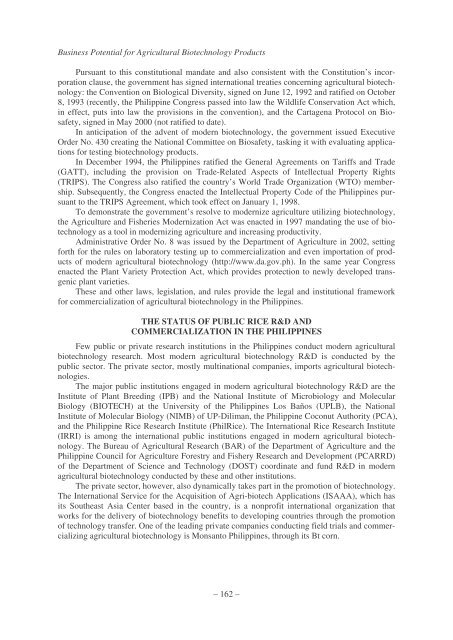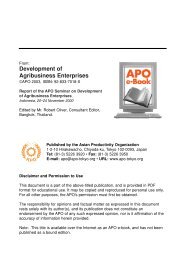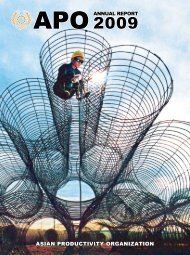Business Potential for Agricultural Biotechnology - Asian Productivity ...
Business Potential for Agricultural Biotechnology - Asian Productivity ...
Business Potential for Agricultural Biotechnology - Asian Productivity ...
Create successful ePaper yourself
Turn your PDF publications into a flip-book with our unique Google optimized e-Paper software.
<strong>Business</strong> <strong>Potential</strong> <strong>for</strong> <strong>Agricultural</strong> <strong>Biotechnology</strong> Products<br />
Pursuant to this constitutional mandate and also consistent with the Constitution’s incorporation<br />
clause, the government has signed international treaties concerning agricultural biotechnology:<br />
the Convention on Biological Diversity, signed on June 12, 1992 and ratified on October<br />
8, 1993 (recently, the Philippine Congress passed into law the Wildlife Conservation Act which,<br />
in effect, puts into law the provisions in the convention), and the Cartagena Protocol on Biosafety,<br />
signed in May 2000 (not ratified to date).<br />
In anticipation of the advent of modern biotechnology, the government issued Executive<br />
Order No. 430 creating the National Committee on Biosafety, tasking it with evaluating applications<br />
<strong>for</strong> testing biotechnology products.<br />
In December 1994, the Philippines ratified the General Agreements on Tariffs and Trade<br />
(GATT), including the provision on Trade-Related Aspects of Intellectual Property Rights<br />
(TRIPS). The Congress also ratified the country’s World Trade Organization (WTO) membership.<br />
Subsequently, the Congress enacted the Intellectual Property Code of the Philippines pursuant<br />
to the TRIPS Agreement, which took effect on January 1, 1998.<br />
To demonstrate the government’s resolve to modernize agriculture utilizing biotechnology,<br />
the Agriculture and Fisheries Modernization Act was enacted in 1997 mandating the use of biotechnology<br />
as a tool in modernizing agriculture and increasing productivity.<br />
Administrative Order No. 8 was issued by the Department of Agriculture in 2002, setting<br />
<strong>for</strong>th <strong>for</strong> the rules on laboratory testing up to commercialization and even importation of products<br />
of modern agricultural biotechnology (http://www.da.gov.ph). In the same year Congress<br />
enacted the Plant Variety Protection Act, which provides protection to newly developed transgenic<br />
plant varieties.<br />
These and other laws, legislation, and rules provide the legal and institutional framework<br />
<strong>for</strong> commercialization of agricultural biotechnology in the Philippines.<br />
THE STATUS OF PUBLIC RICE R&D AND<br />
COMMERCIALIZATION IN THE PHILIPPINES<br />
Few public or private research institutions in the Philippines conduct modern agricultural<br />
biotechnology research. Most modern agricultural biotechnology R&D is conducted by the<br />
public sector. The private sector, mostly multinational companies, imports agricultural biotechnologies.<br />
The major public institutions engaged in modern agricultural biotechnology R&D are the<br />
Institute of Plant Breeding (IPB) and the National Institute of Microbiology and Molecular<br />
Biology (BIOTECH) at the University of the Philippines Los Baños (UPLB), the National<br />
Institute of Molecular Biology (NIMB) of UP-Diliman, the Philippine Coconut Authority (PCA),<br />
and the Philippine Rice Research Institute (PhilRice). The International Rice Research Institute<br />
(IRRI) is among the international public institutions engaged in modern agricultural biotechnology.<br />
The Bureau of <strong>Agricultural</strong> Research (BAR) of the Department of Agriculture and the<br />
Philippine Council <strong>for</strong> Agriculture Forestry and Fishery Research and Development (PCARRD)<br />
of the Department of Science and Technology (DOST) coordinate and fund R&D in modern<br />
agricultural biotechnology conducted by these and other institutions.<br />
The private sector, however, also dynamically takes part in the promotion of biotechnology.<br />
The International Service <strong>for</strong> the Acquisition of Agri-biotech Applications (ISAAA), which has<br />
its Southeast Asia Center based in the country, is a nonprofit international organization that<br />
works <strong>for</strong> the delivery of biotechnology benefits to developing countries through the promotion<br />
of technology transfer. One of the leading private companies conducting field trials and commercializing<br />
agricultural biotechnology is Monsanto Philippines, through its Bt corn.<br />
– 162 –
















